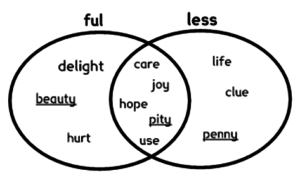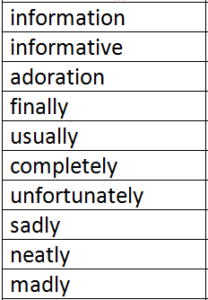23 June 2017
This week’s spellings are all homophones. Practise for a test in two weeks on Friday 7 July.
You child needs to know how to spell each word and also know each word’s meaning. I will put the words into sentences when I test the children. There will be an activity given around the spellings next week for extra practice.
16 June 2017
We’re learning about suffixes for the next few weeks.
This week’s suffixes are either -ful (which means full of) or -less (which means without). We’ve used a Venn diagram to group the spellings. If you’re not sure about what this is, ask your child – or me. The underlined words are words where you need to drop the y for an i before adding the suffix. Children will be tested on 8 of the possible words. Please ask me if you have any questions.

16 June 2017
This week there are no new spellings. The spellings sent last week will be tested on Friday 23 June. Keep learning those spellings using these activities.
Rhymes
Are there any silly rhymes, sayings, or ways of saying the word that will help you remember the tricky bits?
Spellings rules
Can you spot any spelling rules that we have learnt in your spellings? For example: Double the consonant.
Rainbow writing
Write your spellings out in lots of different colours. You could even change the colour for each letter.
16 June 2017
Shakespearean words
For the next two weeks, to coincide with our production, we will be focussing on Shakespearean words. The English language is said to owe a great deal to William Shakespeare. He is believed to have invented over 1700 of our common words by changing nouns into verbs, changing verbs into adjectives, connecting words never before used together, adding prefixes and suffixes, and devising words wholly originally.
This week, children should investigate the following statement and decide if they agree, or disagree…
There’s no point learning about William Shakespeare because we don’t use any of the words he created anymore.
Children should decide if they agree, or disagree, with this statement and justify their opinion.
09 June 2017
This week’s spellings have been chosen from the Year 3 and 4 word list. These spellings are often spelled incorrectly by many children. Learn the spellings for a test on Friday 23 June.

09 June 2017
The spellings this week are all contracted words. We’ve looked at some of these words before but we are not always spelling them incorrectly in our writing.
| do not don’t |
| can not can’t |
| will not won’t |
| did not didn’t |
| have not haven’t |
| has not hasn’t |
| does not doesn’t |
| must not mustn’t |
| should not shouldn’t |
| could not couldn’t |
| would not wouldn’t |
09 June 2017
Homophones are words that sound the same but are spelt differently and have different meanings.
Lots of children in class are still getting confused with these in their writing. Learn to spell the words below, write down the meaning of each word and then put each word into a sentence.
- there their they’re
- male mail
- bored board
- through threw
- knew new
- waist waste
- weather whether
- serial cereal
- aloud allowed
- piece peace
- check cheque
- cent sent scent
09 June 2017
|
Commonly misspelt words This week, we’ve spent some time reflecting on our spelling during our written work. We looked back over the last couple of months and created a bank of words we had spelt incorrectly. Here is a selection of those words. Some of these words may not be used that often. However, the skill of learning how to learn how to spell the word is what’s important. |
| delicately |
| hypothermia |
| privilege |
| enthusiasm |
| intriguing |
| potential |
| conveniently |
| gravitational |
| anonymous |
| mysterious |
09 June 2017
This week’s spelling activity has us making up words again and is due on Thursday 15 June.
We all know Roald Dahl’s wonderfully odd made-up words. Create a dictionary of eight words that we could try and use in class this half-term (obviously without offending anyone). Think about the most sensible way to spell them, how their meaning might link to their root words, how you could use Latin and Greek roots to create them and what word class they are.
Here’s my suggestion (and how you should lay your dictionary out):
stulty – (adjective) a bit stupid
Stultus is Latin for idiot which is what gave me the idea for the word and we could use it in class if somebody suggested a ‘stulty’ idea.
19 May 2017
This week’s spellings end in -ation -ative and -ly. Learn the spellings for a test on Friday 02 June. Remember to use the spelling strategies at the front of your homework book.
